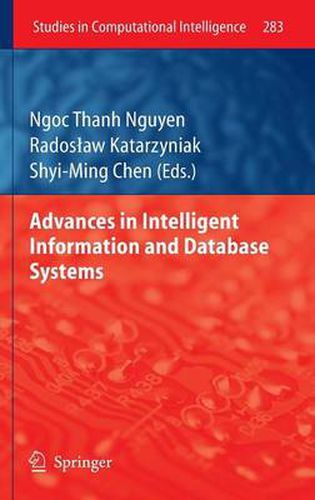Readings Newsletter
Become a Readings Member to make your shopping experience even easier.
Sign in or sign up for free!
You’re not far away from qualifying for FREE standard shipping within Australia
You’ve qualified for FREE standard shipping within Australia
The cart is loading…






This title is printed to order. This book may have been self-published. If so, we cannot guarantee the quality of the content. In the main most books will have gone through the editing process however some may not. We therefore suggest that you be aware of this before ordering this book. If in doubt check either the author or publisher’s details as we are unable to accept any returns unless they are faulty. Please contact us if you have any questions.
Intelligent information and database systems are two closely related and we- established subfields of modern computer science. They focus on the integration of artificial intelligence and classic database technologies in order to create the class of next generation information systems. The major target of this new gene- tion of systems is to provide end-users with intelligent behavior: simple and/or advanced learning, problem solving, uncertain and certain reasoning, se- organization, cooperation, etc. Such intelligent abilities are implemented in classic information systems to make them autonomous and user oriented, in particular when advanced problems of multimedia information and knowledge discovery, access, retrieval and manipulation are to be solved in the context of large, distr- uted and heterogeneous environments. It means that intelligent knowledge-based information and database systems are used to solve basic problems of large coll- tions management, carry out knowledge discovery from large data collections, reason about information under uncertain conditions, support users in their for- lation of complex queries etc. Topics discussed in this volume include but are not limited to the foundations and principles of data, information, and knowledge models, methodologies for intelligent information and database systems analysis, design, implementation, validation, maintenance and evolution.
$9.00 standard shipping within Australia
FREE standard shipping within Australia for orders over $100.00
Express & International shipping calculated at checkout
This title is printed to order. This book may have been self-published. If so, we cannot guarantee the quality of the content. In the main most books will have gone through the editing process however some may not. We therefore suggest that you be aware of this before ordering this book. If in doubt check either the author or publisher’s details as we are unable to accept any returns unless they are faulty. Please contact us if you have any questions.
Intelligent information and database systems are two closely related and we- established subfields of modern computer science. They focus on the integration of artificial intelligence and classic database technologies in order to create the class of next generation information systems. The major target of this new gene- tion of systems is to provide end-users with intelligent behavior: simple and/or advanced learning, problem solving, uncertain and certain reasoning, se- organization, cooperation, etc. Such intelligent abilities are implemented in classic information systems to make them autonomous and user oriented, in particular when advanced problems of multimedia information and knowledge discovery, access, retrieval and manipulation are to be solved in the context of large, distr- uted and heterogeneous environments. It means that intelligent knowledge-based information and database systems are used to solve basic problems of large coll- tions management, carry out knowledge discovery from large data collections, reason about information under uncertain conditions, support users in their for- lation of complex queries etc. Topics discussed in this volume include but are not limited to the foundations and principles of data, information, and knowledge models, methodologies for intelligent information and database systems analysis, design, implementation, validation, maintenance and evolution.